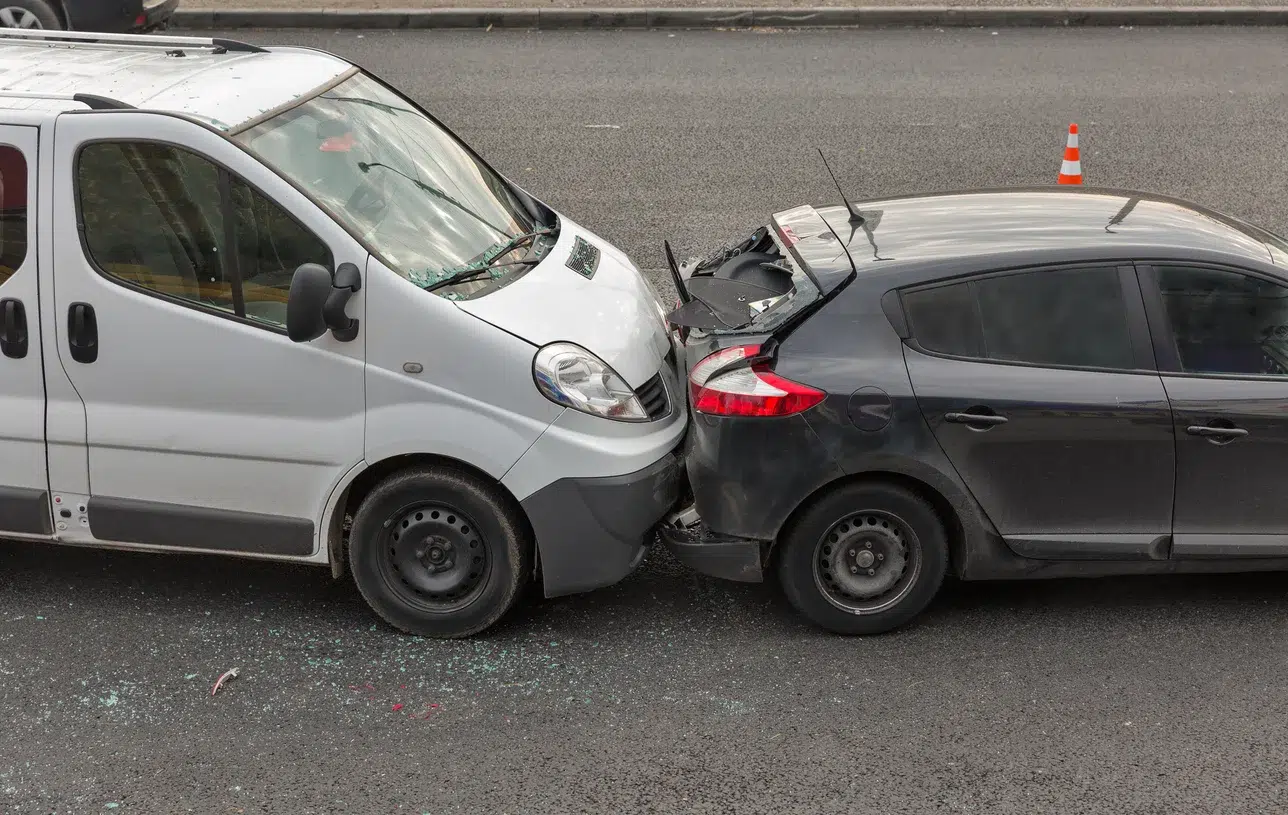At Delfino, Green & Green, we understand that even seemingly minor auto accidents can have a tremendous impact on an individual’s life, causing long-lasting injuries and devastating their finances. Luckily, we may be able to help. Schedule a free consultation to learn more.
Countless car accidents happen every day, and while some people walk away from serious collisions with nothing more than a scrape or two, others suffer serious, debilitating injuries. And while we typically associate serious injuries with major crashes, they can also be caused by seemingly minor car crashes.
Rear-end collision accidents are a prime example. Even when they only cause minimal damage to the vehicles involved, they can result in serious injuries to the drivers and passengers. For example, a rear-end collision can cause the driver’s head to jerk violently back and forth, resulting in whiplash, concussions, and even post-concussion syndrome.
Fortunately, individuals who suffer injuries and other losses in rear-end collision accidents may be eligible to pursue compensation through a car accident claim. Not sure how to get started? Don’t worry — Delfino, Green & Green is here to help. This article will explain everything you need to know about suing for a rear-end collision accident, including common causes of rear-end accidents, types of damages you can claim, when to sue, and more.
Has a serious car accident left you struggling financially? We may be able to help you secure compensation through a personal injury lawsuit. Schedule a free case evaluation to explore your legal options with a compassionate attorney.
Common Causes of Rear-End Accidents
Rear-end collision accidents are among the most common types of car accidents. They can be caused by numerous factors and situations, from driver errors to road obstacles to poor weather conditions. Here are some of the most common reasons these accidents occur:
- Distracted driving. Texting, talking on the phone, eating, or otherwise engaging in distractions while driving increases a driver’s risk of being involved in an accident.
- Tailgating. Following too closely behind another vehicle can leave a driver with less reaction time and increase their risk of causing a rear-end collision — especially if the driver in front of them stops abruptly.
Speeding. Driving at high speeds can increase the risk of any type of accident, including rear-end accidents. - Sudden stops. If the driver in front of you stops suddenly, it may cause a rear-end collision — especially if you’re tailgating.
- Weather conditions. Heavy rain, snow, ice, and fog can reduce visibility and traction, making it more likely for you to be involved in a collision.
- Road conditions. Uneven surfaces, potholes, construction, and debris on the road can cause drivers to brake or swerve suddenly, leading to accidents.
- Mechanical failure. Mechanical issues, especially brake failure, can make it difficult for a driver to stop in time to avoid an accident.
- Driving under the influence. Driving under the influence of drugs or alcohol can slow reaction times and impair a driver’s judgment, making it more likely that they are involved in a car accident.
- Traffic congestion. Rear-end collisions are more likely to occur in heavy traffic that requires frequent starts and stops.
This is not an exhaustive list of causes, but just a few of the most common reasons that rear-end collision accidents occur. Driver inexperience, inattention to traffic lights and signage, and more also contribute to this type of accident.
Types of Damages You Can Claim After a Rear-End Collision
You can claim a wide range of compensatory damages through a car accident lawsuit, including both economic and non-economic damages. Whereas non-economic damages refer to compensation for easily calculable financial losses, economic damages compensate plaintiffs for intangible losses.
Here are a few examples of each:
- Economic damages. Economic damages may provide compensation for all accident-related medical costs, including medical bills for emergency room visits, hospital stays, surgeries, physical therapy, prescription medications, etc. They also compensate injury victims for other financial losses, such as lost wages, loss of earning capacity, property damage, and other out-of-pocket expenses.
- Non-economic damages. Non-economic damages may compensate plaintiffs for losses that evade a dollar amount, such as for pain and suffering, emotional distress, loss of consortium, and loss of enjoyment of life.
In rare cases, the court will also award punitive damages. Rather than to compensate the injury victim for accident-related losses, punitive damages are designed to punish the defendant for especially egregious, malicious, or wanton behavior.
When to Sue for a Rear-End Collision Accident
California negligence laws follow the legal doctrine of pure comparative negligence, meaning that accident victims can sue even if they are partially responsible for the accident. However, their recoverable compensation is reduced by their percentage of fault, so it typically doesn’t make sense to sue if you were largely responsible for the accident.
Ultimately, each rear-end collision accident case is different, and determining whether or not to pursue a lawsuit depends on a variety of factors. The best way to gain clarity about your situation is by speaking with an experienced rear-end collision accident attorney. That being said, you may want to consider legal action if the following are true:
- You weren’t the primary cause of the accident.
- You suffered serious injuries or other losses in the accident.
- Your accident has left you financially vulnerable.
- The accident has altered your ability to work, earn money, or enjoy life like you used to.
If you answered yes to one or more of these questions, your best course of action is to seek legal advice from an experienced personal injury attorney. A qualified legal professional can review the details of your case in a free consultation and help you pursue the best legal path forward.
Preparing for the Rear-End Collision Lawsuit
When you’re ready to pursue compensation for your accident-related losses, the first step is to schedule a free consultation with a qualified personal injury and car accident lawyer. These types of legal professionals typically work on a contingency-fee basis, meaning that if they take your case, you won’t need to pay a dime upfront. You will only pay them if and when they secure a settlement for you.
After you partner with an attorney, they will help you gather the pertinent evidence and documentation. This could include photos and videos from the accident scene, police reports, eyewitness statements, and any other evidence that corroborates your version of events. After a thorough assessment of the evidence, your attorney will pinpoint the at-fault party, which could be another driver, multiple drivers, a pedestrian, a government entity, a car parts manufacturer, or another entity.
Next, your motor vehicle accident lawyer will calculate your total damages to create a settlement demand. They will draft and send a settlement demand letter to the at-fault driver or the driver’s insurance company and try to negotiate a fair settlement. If the at-fault party doesn’t make a fair settlement offer, your attorney will prepare your case for court. In court, they will present compelling evidence, use witness testimony, and argue for your maximum compensation.
Delfino, Green & Green: Top Car Accident Attorneys in California
Some rear-end collision accidents are just fender benders; others take a devastating toll on those involved. Here’s the bottom line: If you suffered serious accident injuries or losses in a collision you didn’t cause, you shouldn’t be footing the bill — period.
At Delfino, Green & Green, we’re proud to offer top-tier legal services to injury victims in San Francisco, San Rafael, and across California. Our car accident attorneys have the experience, expertise, and drive to help you pursue the compensation and justice you deserve. Ready to get started? Schedule a free consultation to explore your legal options today.



